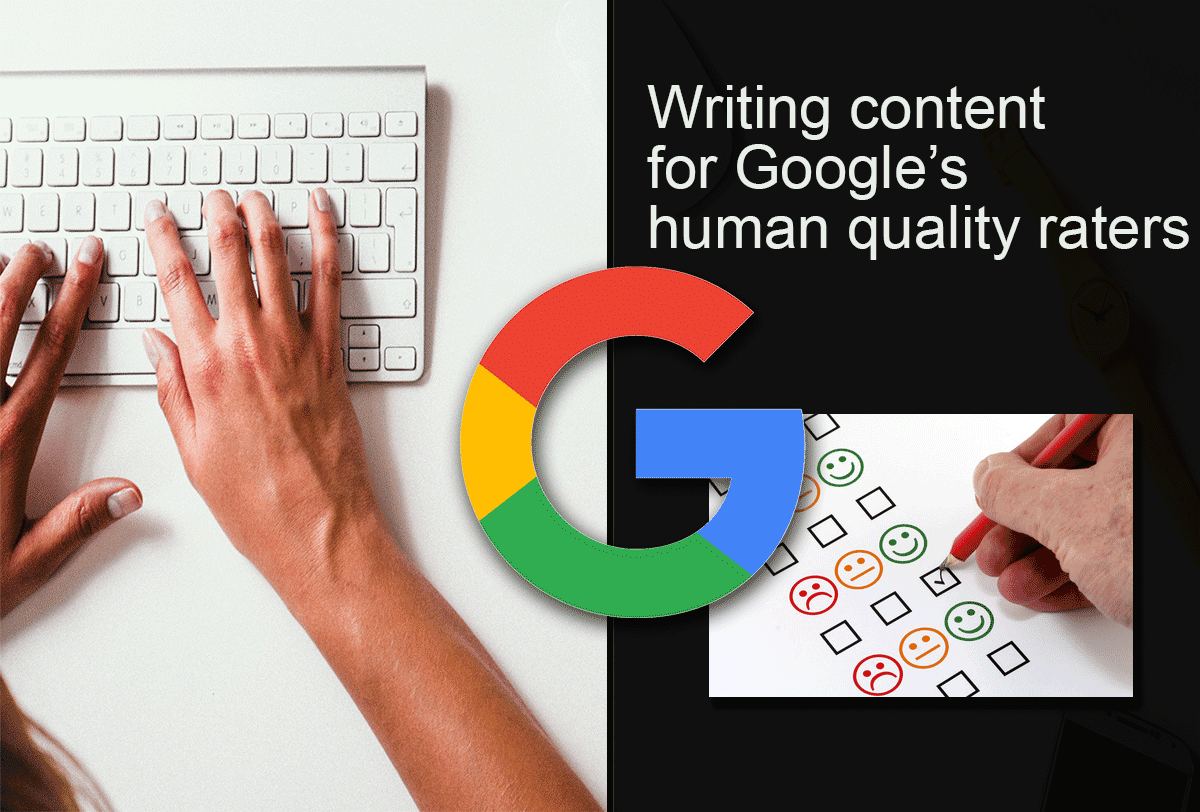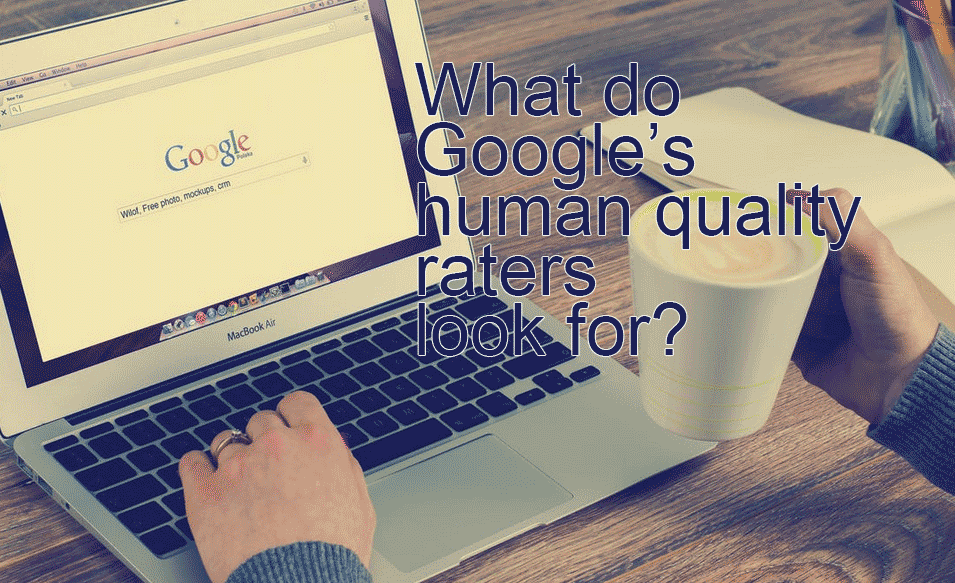
Do you know Google has its official human search quality raters?
Around 10,000.
Google has been seeking help from human quality raters since 2005.
Here is a Search Engine Land update on the search quality rater guidelines update that Google recently released.
Here is the copy of the guidelines.
Not to totally rely on its algorithms, these Google human quality raters are given actual searches to conduct, drawn from real searches on Google. Then these quality raters have to rate the top results.
It has been said for a long time that your content writing should be more for humans and less for search engine algorithms.

But this is because it is often believed that the ranking algorithms are as good as humans and when they are ranking your content, they are using many human factors.
Though, this is still true and when you write content you should still focus more on the “human side”, the fact that Google uses actual human search quality raters makes it more important that you write content centered around actual people rather than trying to trick the search engines.
Most of the SEO websites say that the human quality raters have no direct bearing on your search engine rankings. For example, if a human quality rater doesn’t like your content and reports your content to Google, your rankings may not suddenly dip.
The data from the quality raters is used for experiments in the Google search lab.
Does it mean you shouldn’t care for the opinion of the human quality raters when you are writing content? I wouldn’t advise that.
Simply because, you should anyway be writing for humans, even if you merely want to improve your search engine rankings and nothing else.
What do these human quality raters look for when evaluating your content?

According to the latest guidelines (linked to above) aside from the quality of the content and the genuineness of what is being said, the human quality raters from Google must also take into consideration the “reputation” of the author.
In the guidelines, this text appears: “Reputation of the website or the creator of the main content”.
What does this mean?
The author reputation has been in the reckoning for a long time. Reputation means how well you are known in your field.
In my case, how many people know that I provide content writing services? What do they have to say about my services? Do they like to link to my blog posts?
Algorithmically the Google algorithm can find out how many people are linking to you and how many people are talking about your content on social media and social networking websites, but, according to the current technology, only humans can detect what sort of conversations happen around your content and about your name.
For example, even if you are notorious the Google algorithm may think you have a good reputation simply because many people are bitching about you.
The human quality raters will be able to find out if people say good things about you or bad things.
Another significant point is “beneficial purpose” – what do visitors gain when they visit your website.
This SEMPost blog post explains the new updated guidelines, point by point.
Why it is important to take Google’s human quality raters seriously when writing your content?
Whoever writes about Google’s human quality raters stress upon the point that the ratings don’t impact your search engine rankings immediately.
Most of the findings are used for research purposes and experimentation.
If this is the case, if it doesn’t matter how they think of your website, why you should bother about them?
One reason is, you never know when Google decides to take their opinions seriously and make them a part of its ranking algorithm.
Although artificial intelligence is rapidly reducing reliance on humans, what humans can find, still, artificial intelligence cannot. You don’t want to get caught off guard, the way you were after the Panda and Penguin updates.
The second reason is, most of the guidelines are also applicable to Google’s core ranking algorithm.
Hence, if you write content targeting Google’s human quality raters, you automatically write content for better SEO.
Writing content for Google’s human quality raters
The most significant thing that is emerging out of the new guidelines is the reputation factor.
It is easier to enjoy better search engine rankings if you have a good reputation.
Take for example Seth Godin. Everyone who reads about Internet marketing or digital marketing must know about him.
If he writes even a 200-word blog post about marketing, it will be ranked better than your 5000-word blog post on the same topic, no matter how comprehensive your topic is, if you don’t publish content regularly, and not many people know about you.
This is how even real life works.
Now, I’m not saying this is DEFINITELY going to happen, because rankings depend on many other factors, but this is how reputation works according to Google’s human quality raters’ guidelines.
How do you improve your reputation?

The foundation of reputation is, high-quality content, published regularly. You cannot even think of building your online reputation without high-quality, useful content.
A few months ago I wrote about how to write content for the Google RankBrain system. This system primarily focuses on the searcher’s intent.
When someone searches for information on Google and then comes across your link, and then clicks the link and goes to your website or blog, does he or she find the information he or she intended to find?
Does his or her search stop after having visited your website or blog, or does he or she have to come back to Google and carry on the search?
This is a very pertinent question and it can have a long-term impact not just on your search engine rankings, but also on your overall conversion rate.
If your content solves searcher’s intent, you are publishing relevant, high-quality content.
Then what happens?
People want to link to valuable content. So, they do. They start referring to you as an authority figure. Reputation improves.
People start quoting you because they respect your wisdom. Reputation improves.
People share your content on their social media timelines with greater frequency and when they do, there is lots of activity in terms of “Likes” and “Sharing”. Reputation improves.
Your search engine rankings improve. More of your content is found for relevant search terms and then people go to your website from search engines. They find your content useful. Reputation improves.
Branding is very important.
This is why, even renowned brands use reputed individuals to spread the word around rather than using one of their own experts.
The best example is, search for mobile phone reviews on YouTube. You will find a successful YouTuber explaining the features of the latest iPhone rather than someone from Apple. This is because people trust their favorite YouTuber more than they trust some unknown technologist from Apple.
Listed below are some content writing tips to help you write content for Google’s human quality raters:
- Focus on relevance.
- Always deliver value.
- Focus on one topic at a time.
- Solve real problems.
- Write shorter, crisp sentences.
- Encapsulates the entire essence of your blog post or web page within the main headline.
- Organize your main points under various headings, subheadings and bulleted points.
- Come to the point as fast as you can.
- Become socially active through publishing high-quality content and encouraging engagement around it.
- Write and publish content regularly because more content means more content for Google to index and more content for people to talk about and react to.
Conclusion
As you can see, most of the tips to write content for Google’s human quality raters are also applicable to general SEO writing guidelines.
Hence, the age-old wisdom is always applicable: focus on quality and relevance; publish persistently and make it easier for people to find and share your content on search engines and social media and social networking websites.
